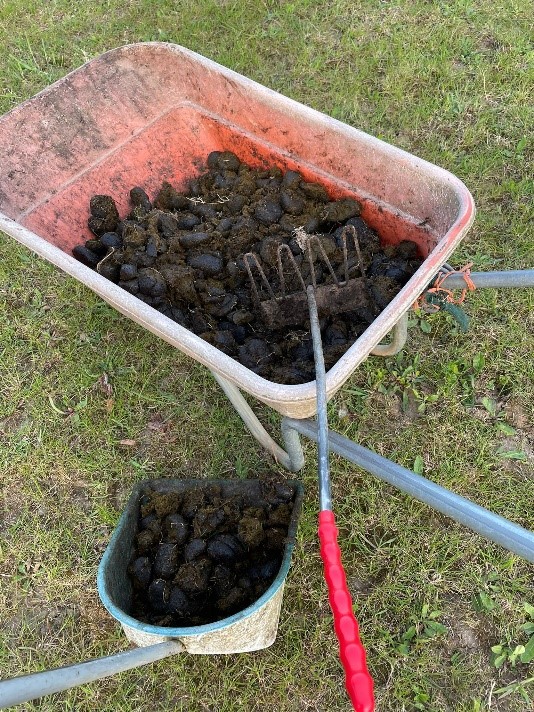
Pasture care and poo picking
The horse insurance team here at SEIB have joined forces with Efecs (Equine Faecal Egg Count Solutions) to give you some top tips on how to reduce the risk of worm reinfection to your horse.
Your horse’s pasture comes under attack from the elements on a daily basis. Over the last few weeks, we’ve seen the ground dry up from being wet and muddy to dry and very hard!
If your horse’s poo gets left on the field, it becomes a breeding ground for parasites – increasing the risk of worm reinfection which you definitely don’t want!
So, how can you keep your field in good condition and safe for your horse?
We speak to Clare and the team at Efecs to find out their top tips:
- If you can, avoid over-grazing to rest the field and allow the grass to recover from ‘poaching’. The recommended ratio is 2 acres for the first horse and an additional acre for each extra horse.
- Strip-grazing is a great way to look after the grass. Create strips with movable fencing so that the whole field isn’t used all the time.
- Check for poisonous plants and weeds and remove them from the field immediately. This prevents them from reseeding and spreading. If you use a weed killer, make sure it’s safe to use around horses and other animals.
- Reseed bare patches as and when they appear, especially in high-traffic areas like gateways. Treating them sooner rather than later will prevent them from spreading.
- As with the grass in your garden, to prevent damage to the grass, don’t leave things in one place for too long. Stand feed buckets in different places each day and if you can, regularly move water troughs.
“POO PICKING IS ONE OF THE MOST IMPORTANT THINGS YOU CAN DO.”
It is VITAL in helping to prevent worm reinfection. It reduces the risk of attracting flies and allows the grass beneath to keep growing.
Poo pick as often as you can – several times a week, if not daily. Especially in summer when flies are much more common.
Also, keep your muck heap as far from your horse as you can. If you have to have your heap in the same field as your horse, fence it off so they can’t graze near it. Redworm larvae can travel up to 3 metres from the muck heap and you don’t want your horse picking them up as they graze!
Keep track of your horse’s worm burden by having them on a targeted worm testing program. Such as the EFECS Annual Subscription Plan. Find out more here.
Checking your fencing and gates
Horses have an innate ability to find things that they can injure themselves on. Scarier still, should they get a leg – or some part of their body – stuck in something, the damage they can do through panicking is truly terrifying. We suggest carrying out a daily check of your fencing and gates. If any repairs are needed, speak to your livery yard owner urgently or carry them out yourself to avoid injuries or potential escapes from the field.
Things lurking in the grass
It is surprising what can be hidden in even relatively short grass. Old tin cans, wire, glass or a paving slab can all cause no end of painful and frightening injuries. It is really important to make sure in a field that is new to you, that you walk every bit of it and make sure that any hazards such as these are removed prior to putting your horse out.
Check for poisonous plants
Sycamore seeds
Horses eating these can result in an often-fatal disease, equine myopathy. It is often considered a seasonal disease owing to the sycamore ‘helicopter’ seeds in the autumn and saplings in the spring. It is something however to be alert for all year round.
Ways to minimise the risks of it affecting your horse include, limiting turnout, sectioning off areas around poisonous trees, remove any sycamore leaves or saplings and make sure the field is not over-grazed. Always keep an eye out for other poisonous plants growing and remove accordingly.
The water trough
Again, whilst long-lasting, metal is often not ideal for a water trough. The corners of square metal troughs can catch passing legs very easily. Many people use a metal trough but place old tyres around the corners to avoid injuries. Purpose-built plastic troughs, may not last for quite as many years, but are generally much more forgiving injury-wise.
Accidents do happen – it is why many insurance policies are taken out. Make sure your horse insurance policy is up to date with cover relevant to your horse’s needs. Also, as many field injuries involve cuts, when your horse has his annual flu-jab, remember to double-check with your vet that your horse is up to date with his tetanus vaccination which after an initial course is due every two-years.
About SEIB
SEIB have been arranging insurance for horses for over 50 years. This experience allows us to tailor policies to suit your circumstances and ensure that you and your horses are covered should the worst happen.